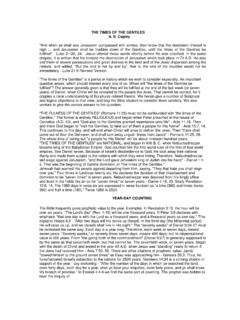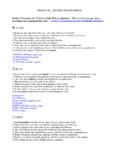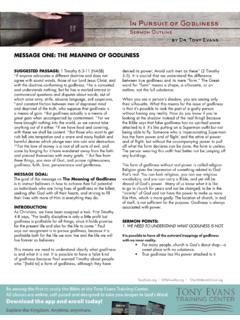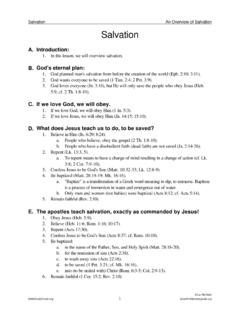Transcription of A Dictionary Of the Proper Names of the Old and New ...
1 A Dictionary Of the Proper Names of the Old and New Testament Scriptures, being and Accurate and Literal Translation from the Original Tongues By J. B. Jackson Preface Some years since, the present writer, in pursuing his studies in the Bible, reached a portion which consisted largely of Proper Names , and at once he was confronted with the fact, that a considerable and, to him, important portion of the Bible was untranslated. Fully persuaded that whatsoever things were written aforetime were written for our learning, and that all Scripture is given by inspiration of God, and is profitable for doctrine (Rom.)
2 15:4, 2 Tim. 3:16); and hence that there could be no idle word in God s Book; he set about preparing an accurate, alphabetical list of all the Proper Names of the Old and New Testaments with a view to securing the best possible renderings of the same. Fortunately, there was ready access to the works of Cruden, Long, Oliver, Young, Wilkinson, Charnock, McClintock & Strong, Smith s Bible Dictionary , Abbott s Dictionary , Imperial Bible Dictionary , Encyclopaedia Biblica, and, before the list was complete, Strong s Concordance, Tregelles, F.
3 W. Grant, and others. At the end of about three years, the writer had obtained a meaning for nearly every Proper name in the Bible, and, on the recommendation of friends, began preparations for publishing the results of his labours for the benefit of others similarly interested. His plan was to arrange the Names alphabetically, as spelled in our common English Bibles, attaching the meanings he had found in the order in which he considered them to have weight, , in the order in which he considered their sources to be authoritative.
4 At the end of this part of his work, ere he went to press with his new Onomasticon, it occurred to him to experiment a little with some of the meanings he had secured in order to see how they would work in the elucidation of some of those passages which had first suggested the need of his researches. The result was as perplexing as it was curious; in some cases no less than twelve different, not to say opposite, meanings were given to the same name by the same writer. But which, if any one of them, was the English equivalent of the Hebrew or Greek name under consideration?
5 That was the important question, to determine which. A few of these Names were subjected to rigid, etymological analysis during which two discoveries were made, viz.: 1. That not one of these onomasticographers could be depended upon throughout his whole list of Names . 2. That every Scripture was that the man of God may be perfect, fully fitted to every good work. (2 Tim. 3:16-17 literal rendering) A new start was made; all meanings were discarded and each name was traced to its own roots in the original tongue and the meaning derived according to the etymological rules and usage of the language in which it was written.
6 In the present work all current authorities have been used or consulted, such as Robinson s Gesenius, Fuerst s Hebrew Lexicon, Davidson s Hebrew and Chaldee Lexicon, Davies Hebrew Lexicon and, now that it is completed, the learned and laborious Hebrew and Chaldee Lexicon by Brown, Driver & Briggs as well as Tregelles and some others for portions. For the New Testament Names , the Greek Lexicons of Liddell & Scott and Parkhurst have been mainly relied upon. The one controlling idea in the preparation of this work has been to provide the English-speaking reader with an exact, literal equivalent of the original Hebrew, Chaldee (Aramaic), or Greek name , and this the reader may expect to find.
7 In each and every case the author has compared his rendering with the rendering given by the onomasticographers above mentioned and, where he differs from them, he is quite prepared to give a satisfactory reason for the difference to anyone competent to form a judgment. Where such different rendering is possible or plausible he has not failed to give it a place with his own. In addition to this he has carefully noted each meaning as related to its context since the passage in which a name occurs will often throw light upon the particular shade of meaning to be given to it.
8 As an illustration of how the present writer finds it necessary to differ from men of unquestioned scholarship, the name Abijam may be instanced:- One of the ablest of modern Hebraists, in his Manual of Hebrew, gives the meaning great sailor, from abi, meaning father of (being ab in the construct state, and ab means father ), and yam, meaning sea, , father of the sea. Now the scholarship of the author of the manual is above question. As a Hebraist he had few equals and he knew perfectly well that the literal force of those two words was father of the sea, and that they would, etymologically, admit of no other meaning whatever (if we allow the single exception of my father is the sea.)
9 There is nothing in the words themselves to exclude such a meaning ), but at once the learned professor allows himself to be swayed by the apparent strangeness of the name and tapers it down to great sailor, losing sight of the original words entirely. Of what use is the most eminent scholarship, if, with all its ability to give us bread, it give us but a stone? By far the best work on Proper Names known to the writer is that by Mr. Alfred Jones published by Bagster & Sons. It treats only the Names in the Old Testament, and not a few of those are omitted for some reason, but the plan, as well as the typographical execution of the work, is excellent although the result is frequently disappointing and in more ways than one, particularly in the author s arriving at the Proper literal meaning by his analysis, and then, for reasons other than etymological, leaves a meaning for the name which loses sight of the origin entirely, as for example.
10 - Omar = uppermost, from the Hithpael of the root amar; it is generally understood, he that speaks, hence Gesenius says, eloquent, , talkative.. Now the verb amar is a very common one and is invariably rendered to say, to utter ; in the Hithpael it is twice used in the sense of boasting self, as in Psalm 94:4, but to call Omar a Hithpael is a mere blunder; it is an orthographic variation of Kal participle active and means saying, or sayer, but not a trace of this meaning in uppermost.









